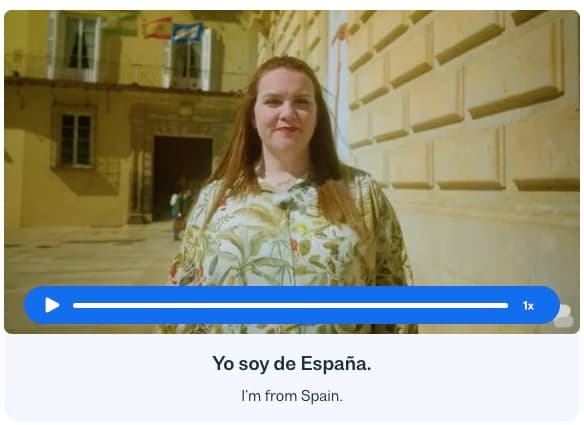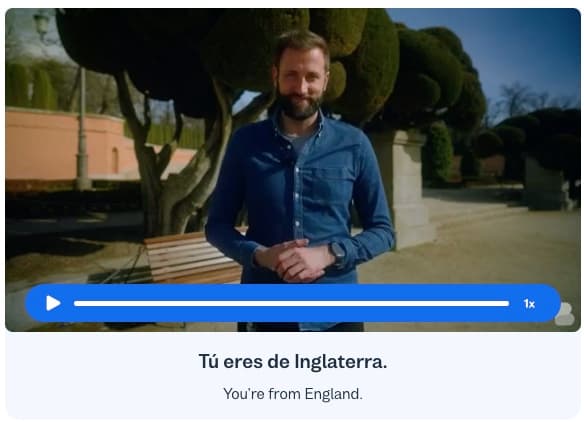I want to learn...
“is one of the most common and important verbs in the Spanish language. It’s used to express identity, characteristics, professions, origin, and much more.
That said, it’s also an irregular verb. This means that it doesn’t conjugate in the same way as most other verbs do. Understanding how it works and its different basic tenses and moods is therefore essential to your language learning.
Present tense
The majority of conversations will revolve around ongoing events and actions If you take anything away from this post, make sure you understand the presente de indicativo.
We use this tense to express permanent states of being, or general statements about a person or thing.

Ser in the presente de indicativo
| Pronoun | Verb | Example |
|---|---|---|
| Yo (I) | soy | Yo soy Daniel. (I am Daniel.) |
| Tú (you - singular) | eres | Tú eres tenista. (You are a tennis player.) |
| Él / ella / usted (He / she / you - formal) | es | Eso es alto. (That is tall.) |
| Nosotros / nosotras (we) | somos | Nosotros somos estudiantes. (We are students.) |
| Vosotros / vosotras (you - plural) | sois | Vosotros sois amigos. (You all are friends.) |
| Ellos / ellas / ustedes (they - masculine / they - feminine / you - plural, formal) | son | Ellas son inteligentes. (They are smart.) |
Past tense
Now that we have a solid understanding of the present tense in Spanish, it's time to move into the realm of the past tense. Building on the foundations we've laid, we'll open up a new dimension of expression and gain the ability to describe past events with fluency and accuracy. Doing so will allow you to tell stories and better connect with people.
In Spanish, there are different past tenses. The simplest are the pretérito perfecto simple and the pretérito imperfecto.
The pretérito perfecto simple (also known as pretérito indefinido) focuses on specific past actions that are seen as completed and separate events, while the pretérito imperfecto emphasizes the background or ongoing nature of past actions, creating a sense of continuity or habitual behavior.
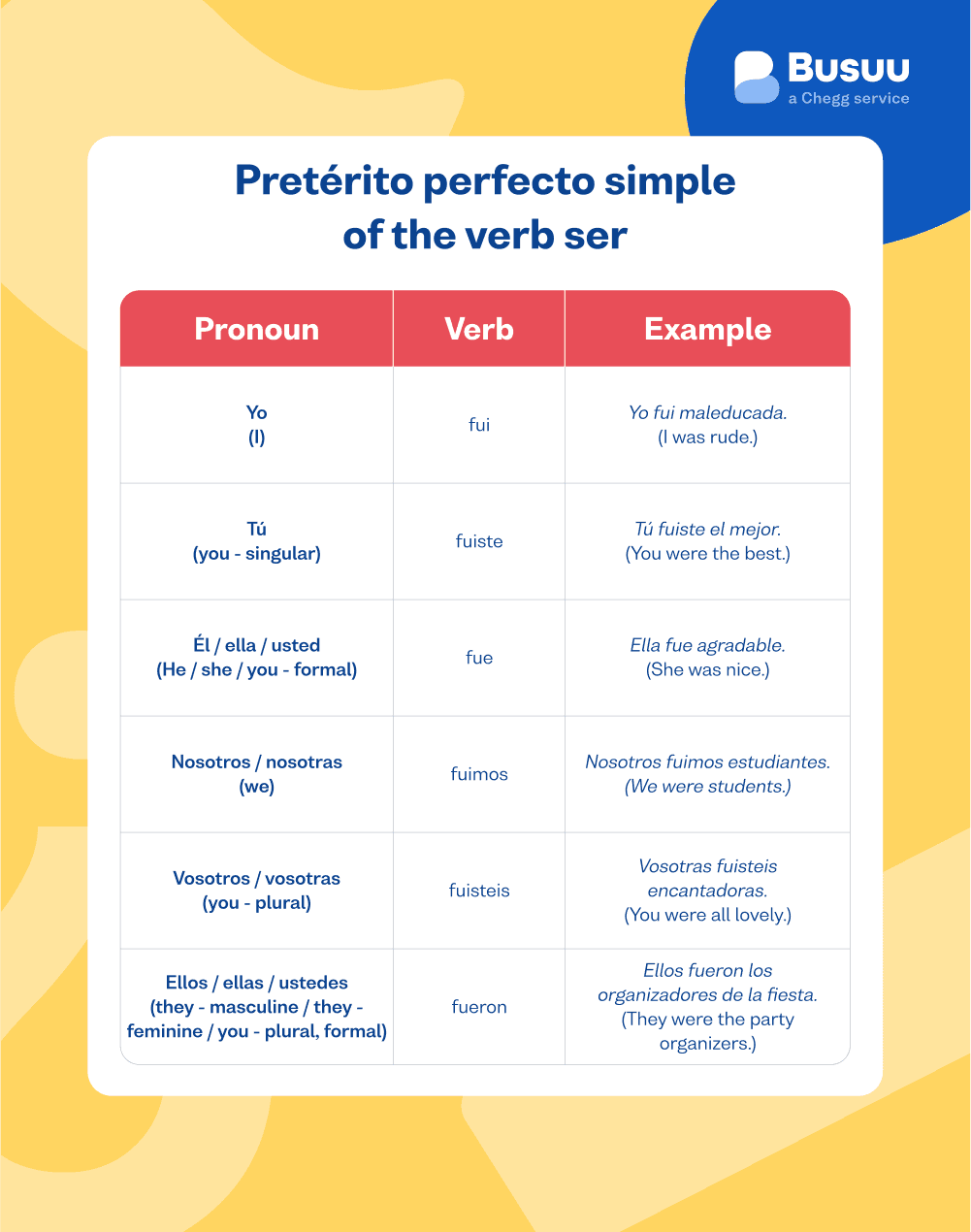
Pretérito perfecto simpleof the verbser
| Pronoun | Verb | Example |
|---|---|---|
| Yo (I) | fui | Yo fui maleducada. (I was rude.) |
| Tú (you - singular) | fuiste | Tú fuiste el mejor. (You were the best.) |
| Él / ella / usted (He / she / you - formal) | fue | Ella fue agradable. (She was nice.) |
| Nosotros / nosotras (we) | fuimos | Nosotros fuimos estudiantes. (We were students.) |
| Vosotros / vosotras (you - plural) | fuisteis | Vosotras fuisteis encantadoras. (You were all lovely.) |
| Ellos / ellas / ustedes (they - masculine / they - feminine / you - plural, formal) | fueron | Ellos fueron los organizadores de la fiesta. (They were the party organizers.) |
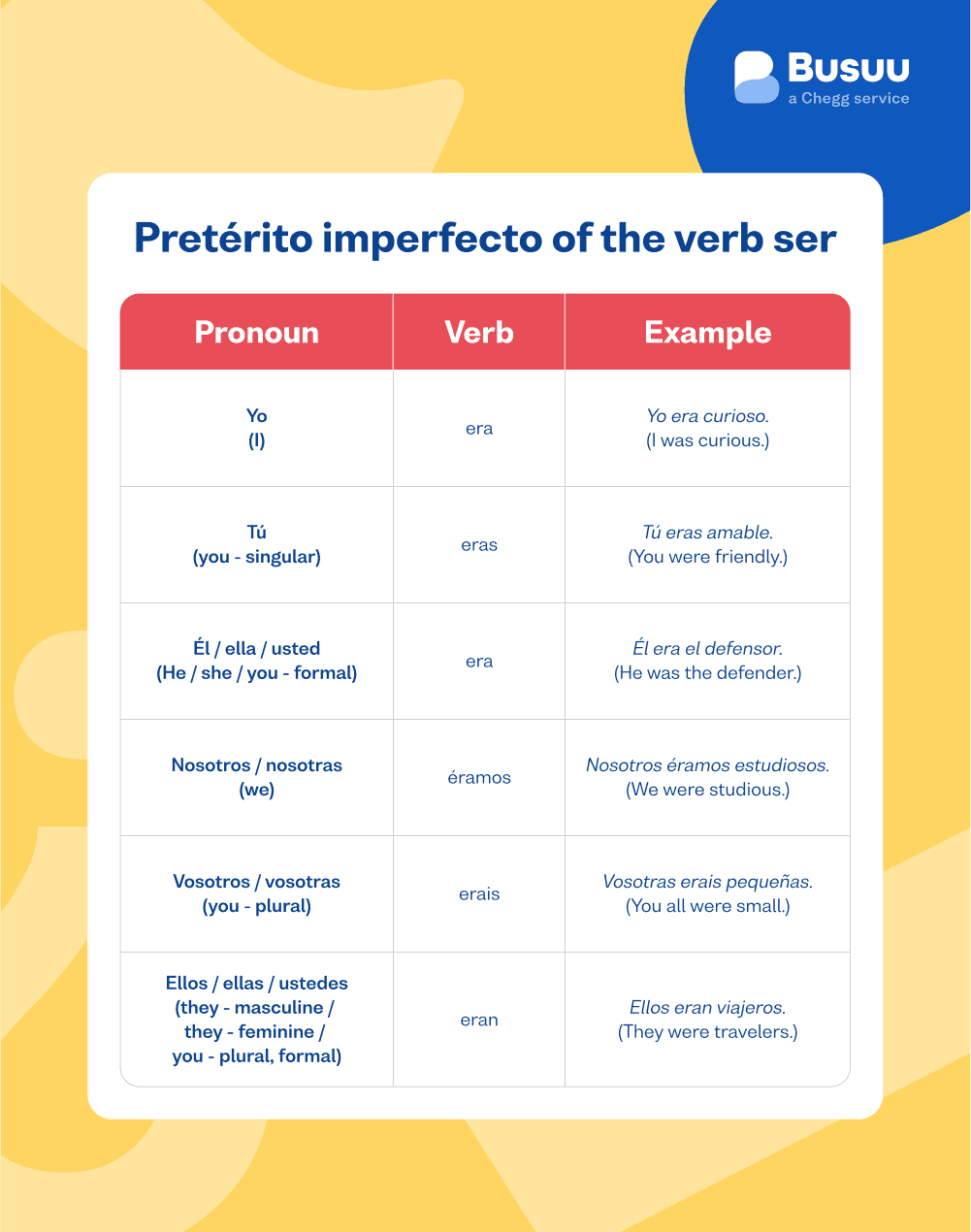
Pretérito imperfecto of the verb ser
| Pronoun | Verb | Example |
|---|---|---|
| Yo (I) | era | Yo era curioso. (I was curious.) |
| Tú (you - singular) | eras | Tú eras amable. (You were friendly.) |
| Él / ella / usted (He / she / you - formal) | era | Él era el defensor. (He was the defender.) |
| Nosotros / nosotras (we) | éramos | Nosotros éramos estudiosos. (We were studious.) |
| Vosotros / vosotras (you - plural) | erais | Vosotras erais pequeñas. (You all were small.) |
| Ellos / ellas / ustedes (they - masculine / they - feminine / you - plural, formal) | eran | Ellos eran viajeros. (They were travelers.) |
Future tense
Now that we have familiarized ourselves with the present tense, which allows us to discuss current events, and the past tense, which allows us to recount past events, it's time to move on to the future tense. This will give us the ability to express future events and aspirations, further enriching our understanding and command of the Spanish language.
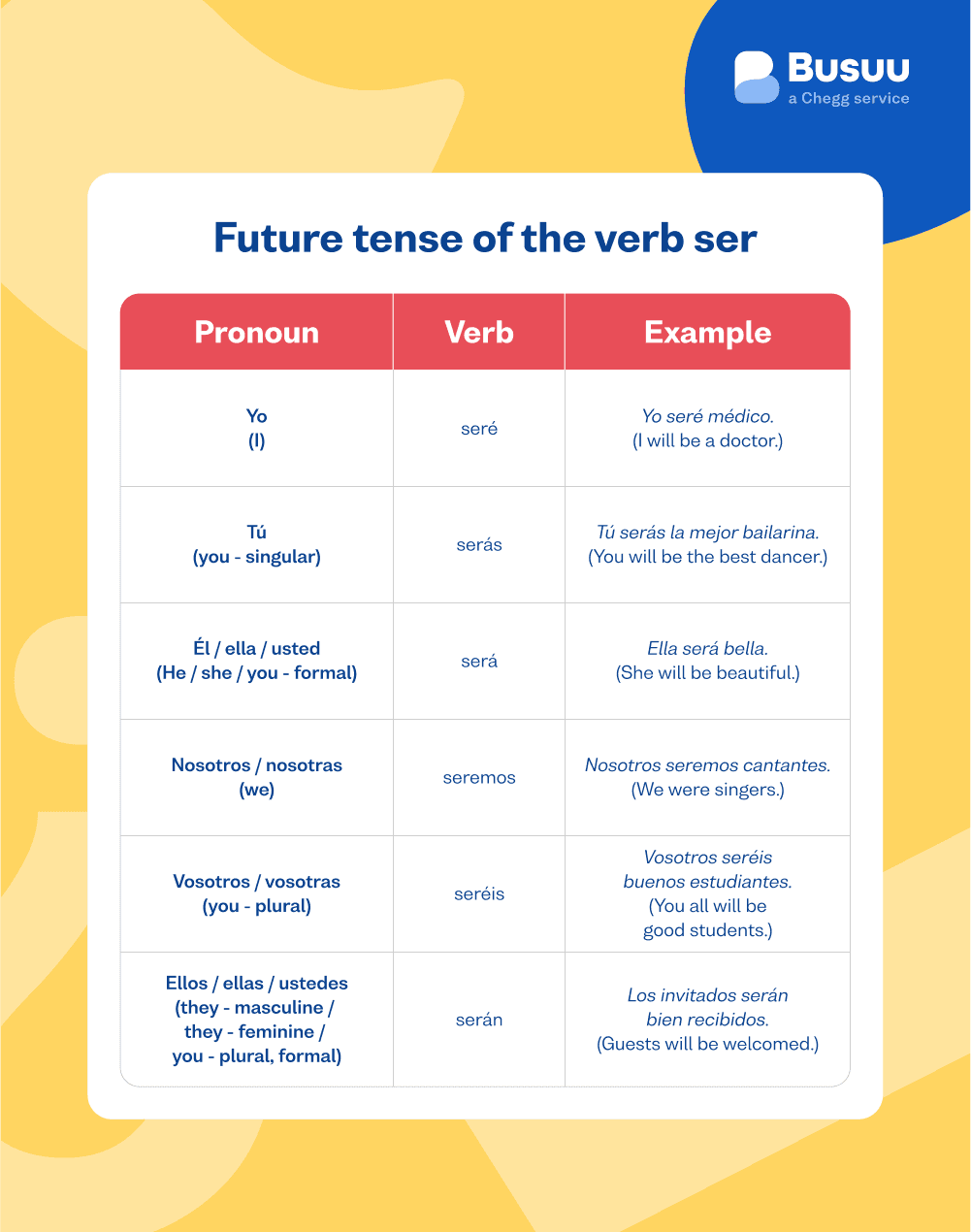
Future tense of the verb ser
| Pronoun | Verb | Example |
|---|---|---|
| Yo (I) | seré | Yo seré médico. (I will be a doctor.) |
| Tú (you - singular) | serás | Tú serás la mejor bailarina. (You will be the best dancer.) |
| Él / ella / usted (He / she / you - formal) | será | Ella será bella. (She will be beautiful.) |
| Nosotros / nosotras (we) | seremos | Nosotros seremos cantantes. (We were singers.) |
| Vosotros / vosotras (you - plural) | seréis | Vosotros seréis buenos estudiantes. (You all will be good students.) |
| Ellos / ellas / ustedes (they - masculine / they - feminine / you - plural, formal) | serán | Los invitados serán bien recibidos. (Guests will be welcomed.) |
Conditional
Once we have mastered the present, past and future tenses, our next step is to learn the conditional tenses. This will allow us to express hypothetical situations, wishes and probabilities in Spanish, taking our language skills to a new level of versatility and precision. Let's dive into the conditional tense and explore its exciting possibilities!
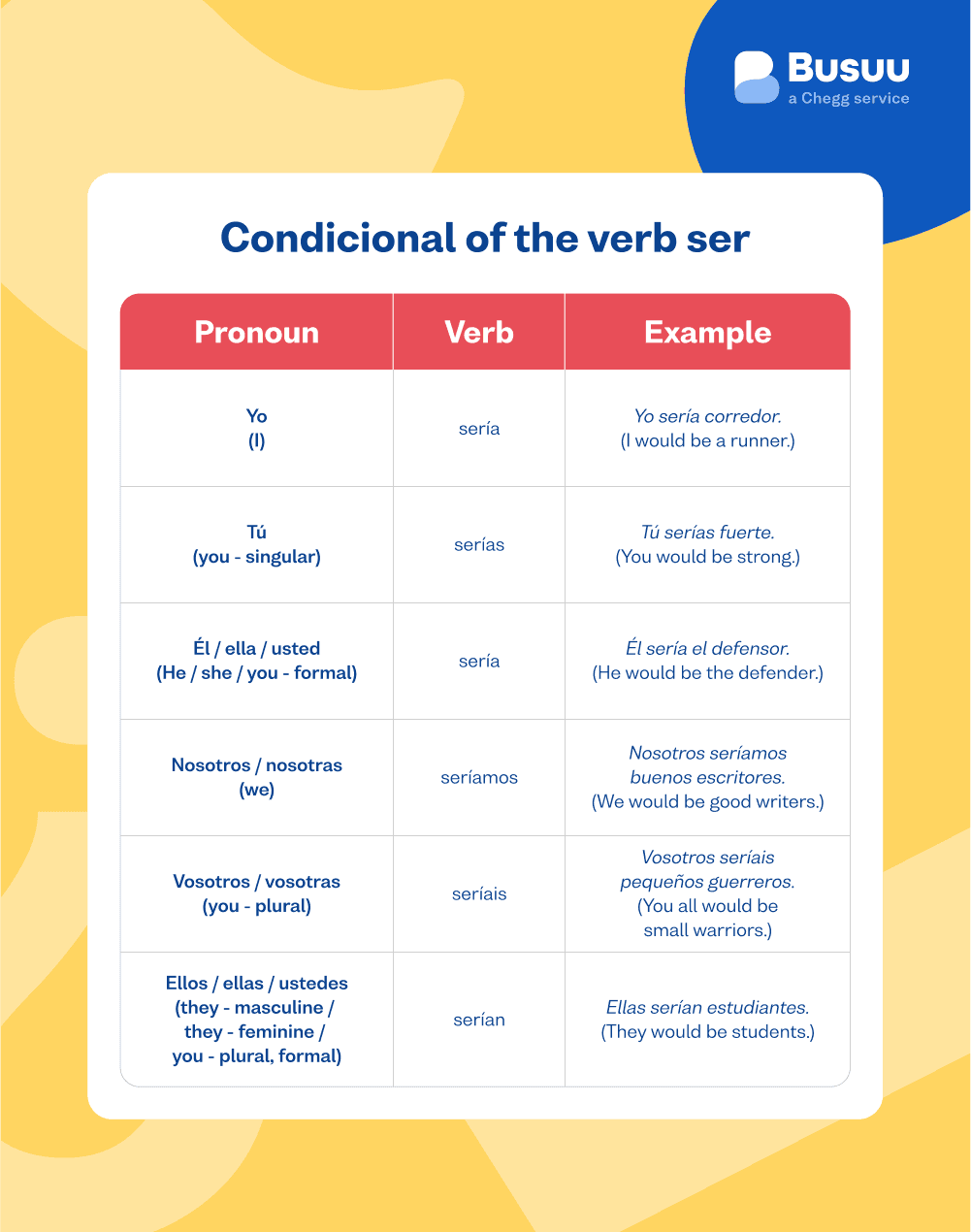
Condicional of the verb ser
| Pronoun | Verb | Example |
|---|---|---|
| Yo (I) | sería | Yo sería corredor. (I would be a runner.) |
| Tú (you - singular) | serías | Tú serías fuerte. (You would be strong.) |
| Él / ella / usted (He / she / you - formal) | sería | Él sería el defensor. (He would be the defender.) |
| Nosotros / nosotras (we) | seríamos | Nosotros seríamos buenos escritores. (We would be good writers.) |
| Vosotros / vosotras (you - plural) | seríais | Vosotros seríais pequeños guerreros. (You all would be small warriors.) |
| Ellos / ellas / ustedes (they - masculine / they - feminine / you - plural, formal) | serían | Ellas serían estudiantes. (They would be students.) |
The conjugation of the verb “ser” can be a little difficult to understand. There isn’t a system to learn it like most of the other verbs that follow the rules of the -er, -ar, or -ir endings. Nevertheless, it's a fundamental aspect of the Spanish language, so it's important that you understand it.
Understanding its forms in different tenses and moods will give you the ability to express identity, tell stories or talk about hopes and aspirations. From the presente de indicativo to the condicional, each conjugation offers a unique way to communicate and connect with others in Spanish.
Now that you master the different tenses of the Spanish verbser, go and immerse yourself in Spanish conversations, texts, and cultural experiences to further develop your understanding and use of the conjugation of the verbser.
Newlanguages

